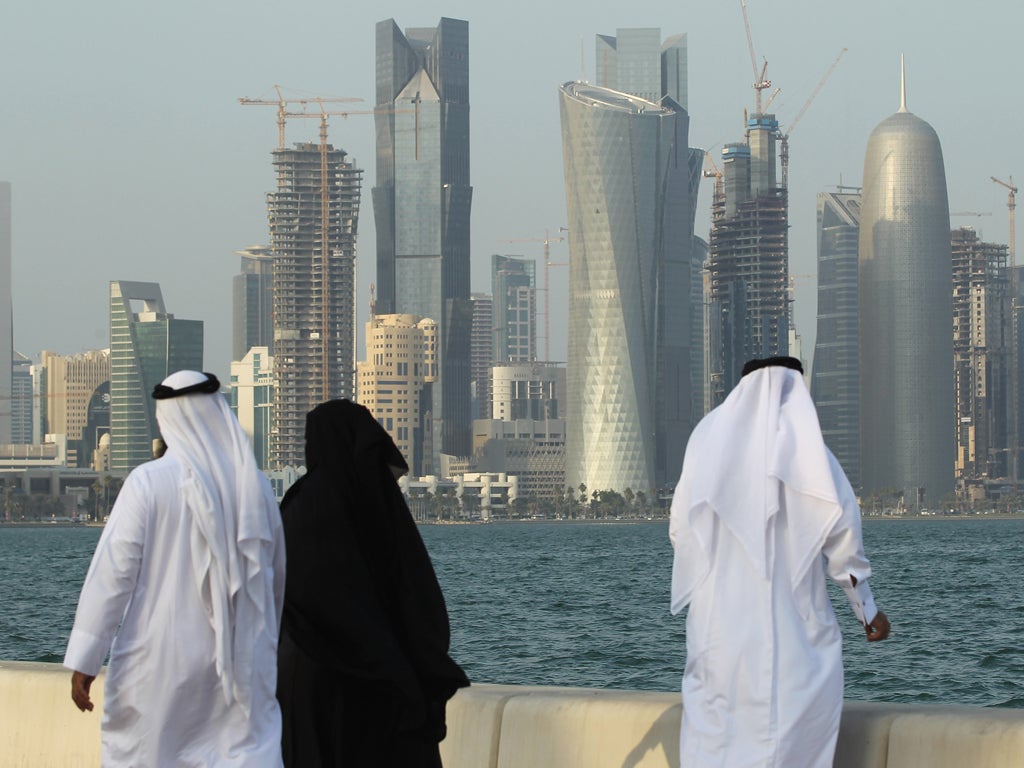Qatar’s success is tarnished by the near ‘slavery’ of its workers
Where are the Islamic voices raised in protest at the abuse of the system?


Qatar has become the showcase for what an autocratic and fundamentalist Islamic regime can achieve, given huge oil revenues and the ambition to stun the world. The Qatar Museum Authority with its annual $250m purchasing budget, the Doha Forum, a magnet for world leaders, and Al Jazeera, a world class TV news channel, are all impressive achievements. Fifa’s extraordinary decision to award the 2022 World Cup to the emirate was another.
But if Sheikh Hamad and his son Sheikh Tamim, who took over in June, are so avid for the world’s attention and esteem, why are they so careless about the conditions in which the foreigners who keep the place going are reportedly forced to work? An investigation this week revealed claims that thousands of migrant workers from Nepal suffer appalling abuse in Qatar’s construction industry, and documented nearly one dying every day in the recent summer months, many more said to be forced into virtual slavery by iniquitous contracts, many others complaining that they have not been paid for months and dozens squatting in the Nepali embassy, put in limbo by their employers’ refusal to allow them to go home.
The Qatari labour ministry said it had strict rules governing working in the heat, the provision of labour and the prompt payment of salaries, and Sheikh Tamim bin Hamid bin Khalifa Al Thani, to give him his full title, if aware of the claims, may consider the working conditions of the penniless infidels who have built his kingdom from nothing is too petty a matter to bother about. But he would be wrong. The Nepalis are brought to Qatar under an Islamic system called kafala: they may only enter if they have a sponsor, and once there they are effectively the sponsor’s chattels, with no freedom to change employer, to go home or anything else. And as they owe hefty sums to the middleman who arranged their jobs, they must work for nothing until the debt is repaid. They are effectively slaves.
This is a grotesque corruption of the kafala concept, which defines both a host’s duty of hospitality to his guest and the relationship of an adult to a foster-child. The western idea of universal rights may be alien to Islam, but in its place there is strong emphasis on the duty of the powerful towards those in their charge. But the way this traditional relationship is abused in Qatar makes the old British imperial system of indentured labour look positively enlightened.
It may be argued this is nothing to do with us, we don’t share the same religion let alone the same form of government as Qatar and there is no reason for the Emir to listen to anything we say. But in that case, where are the Islamic voices protesting against the reported abuse of this system by an ostentatiously pious regime without the excuses of post-colonialism or poverty? Thanks to the success of Opec, the oil-rich states cut themselves off once and for all from their colonial oppressors. The price they pay is that now they must be judged on their own terms. The time is long past when they could take refuge in colonial oppression to justify the moral defects of either their rulers or their subjects.
Two centuries ago, William Wilberforce opened a new chapter in the history of the Christian west by identifying slavery as an institution inherently odious in moral terms. Something similar needs to happen in Islam. If this religion is, in the eyes of the non-Islamic world, to mean more than the butchery of innocent women and children doing the weekly shop in Nairobi or emerging from Christian worship in Peshawar, or the obligation of women in Britain to walk the streets in black-out, it is time to hear Islamic voices raised in defence of what are so often advertised as Islamic values when the people contravening them are themselves Muslims, and wealthy and powerful ones at that.
Is this a creed worthy of the respect of those who do not share its beliefs, capable of inspiring reform and moral rectitude? Or merely a flag of convenience for people whose real values, as opposed to those they so loudly proclaim, are splashed in blood from Delga to Maaloula to Mogadishu?
Rome’s problem – too much beauty
Catch La Grande Bellezza, the new film by Paolo Sorrentino which is Italy’s hope this year for a Best Foreign Film Oscar. It’s better than a trip to Rome – it’s the most ravishing evocation of the place ever to reach the screen, outdoing all previous efforts because it meets the challenge of reproducing Rome’s beauty head on, with a wide screen and luscious colour and dazzlingly lovely locations.
As a result it encapsulates, frame by delirious frame, the ridiculous quandary of the hero, a social butterfly whose only claim to fame is a slim novel written many decades earlier. Surrounded by beauty of this intensity, what can you do but surrender to it? When you are no more than a votary in this peerless, citywide shrine to beauty, what can you do with your life but fritter it away? It’s not a problem most of us face, but for anyone who knows Rome, it rings a bell.
Join our commenting forum
Join thought-provoking conversations, follow other Independent readers and see their replies
Comments